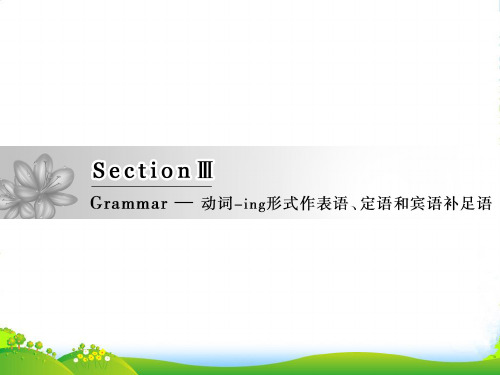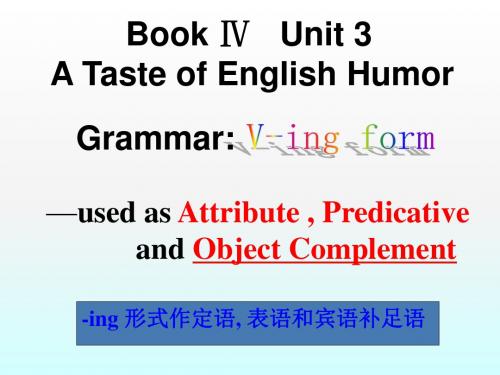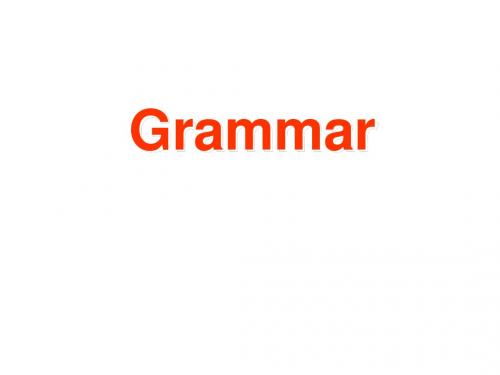【精品】【人教版】必修四:Unit 3 Period 3 Grammar 讲义(含答案)
高中英语人教必修四:Unit3SectionⅢGrammar—动词ing形式作表语、定语和宾语补足语

即时演练 3 3-1.用所给动词的适当形式填空 ①(全国卷Ⅱ改编)They use computers to keep the
traffic running (run) smoothly.
②(辽宁高考改编)The old couple often take a walk after supper in the park with their pet dog
自主探究
(1)动词ing 形式可在句中作 表语 (句⑦)。 (2)动词ing 形式可在句中作 定语 (句②、③、⑤)。 (3)动词ing 形式可在句中作 宾语补足语 (句①、④、
⑥)。 (4)由句②和句③可以看出单个现在分词作定语时要放在
它所修饰的名词之 前 ;现在分词短语作定语时放在它所 修饰的名词之后 。
即时演练 2 2-1.用所给动词的适当形式填空
①Our school went on an organized (organize)
trip last week.
②He said if we had any questions to ask (ask),
he would help us. ③(山东高考改编)There's a note pinned to the door
following (follow) them.
3-2.完成句子
③I suddenly felt myself being hit by a heavy
fist. 我突然感到自己被重重地打了一拳。
④His question has set me thinking .
他的问题让我深思。
⑤We shouldn't keep our lights burning in the
最新人教版 英语 必修四 UNIT 3 语法讲课稿

2. Mr Smith, ______ of the ______ speech,
started to read a novel.
A. tired; boring
B. tiring; bored
C. tired; bored
D. tiring; boring
解析:此题考查现在分词与过去分词的区别。tired, moved, interested excited等过去分词叙述 的是人的本身感受;tiring, moving, interesting, exciting等现在分词叙述的是某 一物或事情给予人的感受。句意为“史密斯先生
chew
skin
bottom content astonish throughout particular failure
outstanding boil
Answer key for Exercise 2:
chew; astonished; contented; particular; failure; skin
bottom; throughout;
Noun
Adjective
enjoyment enjoyable
entertainme entertaining
nt
mouth
mouthful
help
helpful
Noun difficulty cruelty
honesty fortune
Adjective difficult
人教版 英语 必修四 UNIT 3 语法
Alternative words and expressions break down food using teeth outer covering of a body or plant the lower part or point of something be happy and satisfied with; not wanting more surprise greatly in every part of special, more than usual someone or something that is not successful extremely good when water is hot enough to turn into gas
人教高中英语必修4Unit3Grammar公开课课件

现在分词作表语主要用以说明主语的性质,不能与主语互换位置, 例如: The story is interesting .不可改为:Interesting is the story.
b).作表语的动词-ing(及现在分词)所体现的是形容词的特征,表明的是主语的性质或 特征,可有比较级形式,亦可被very,quite,so等副词修饰,这时主语与表语的位置不可互 换。常用来作表语的动词-ing形式astonishing,amusing,confusing,disappointing, boring,encouraging,inspiring,moving,tiring,interesting,surprising等。
①作表语的动名词与主语指的是同一件事,此时系动词相当于 “是”,通常把主语和表语的位置互换,语法和意思不变,例如:
f)终止系动词 表M示y h主obb语y i已s s终wim止mi动ng.作可改,为主Sw要im有minpgroisvmey,htoubrbny.(可ou将t原, 表句
达"证中实的",主语"变与表成语"位之置意互,换)例如: The rumor proved false. 这谣言证实有假。 The search proved difficult. 搜查证实很难。
Quiz:(Pair- work, 2 mins)
判断在下列句子中的动词-ing形式是名词还是现在分词。
Pretending to listten to Miss Tang is stupid.
பைடு நூலகம்动名词
The speech of the disabled sportsman was inspiring.
人教高中英语必修4Unit3Grammar课件 (共29张PPT)

2) –ing用来表示主语所具有的特征,如: His concern for his mother is most touching.
他对母亲的关爱很感人。
His words are encouraging. 他的话很鼓舞人。
3、-ing形式作宾语补足语 1) 动词-ing形式作宾语补足语常放在宾语后面,表示 一个正在进行的主动性的动作,强调一个正在进行 的动作或一种状态。如: 当我们回到学校时, 发现一个陌生人站在大门口。
2) Such training was common in acting families at this time.
3) Charlie spent his childhood (in) looking after his sick mother and his brother.
4) His subtle acting made everything entertaining.
A. tired; boring B. tiring; bored C. tired; bored D. tiring; boring
解析:此题考查现在分词与过去分词的区别。 tired, moved, interested excited等过去分词叙 述的是人的本身感受;tiring, moving, interesting, exciting等现在分词叙述的是某一 物或事情给予人的感受。句意为“史密斯先生 对这个令人厌烦的讲话感受厌倦了,所以开始 读起一本小说来”。
3.To enjoy some useful English expressions using -ing form.
-ing form
Discovering Useful Structures
高中英语 Unit 3 第四学时 Grammar课件 新人教版必修4

第一页,共15页。
第四学时(xuéshí) Grammar
第二页,共15页。
第三页,共15页。
语法 精讲
动词ing形式(xíngshì)作表语、定语和宾语补足语
第四页,共15页。
语法
精 讲 一、动词(dòngcí)ing形式作表语
1.动词ing作表语时放在系动词之后,表示抽象的一般性的 行为,用来说明主语的内容,与主语通常是同一概念,表语和主 语常可互换位置。
2.While she was getting me ____ (settle) into a tiny but clean room...
解析:因句中已有谓语was getting,所以settle为非谓语 动词;由句中结构可知,此非谓语动词作宾补;根据 (gēnjù)settle sb.into...,可见me与settle是被动关系, 故用ed形式,即用settled作宾补。
答案: settledng you English. =Teaching you English is my job. 我的工作(gōngzuò)是教你们英语。 My favorite sport is swimming. =Swimming is my favorite sport. 我最喜欢的运动是游泳。
第十三页,共15页。
语法 精讲
解析:因句中已有谓语can help,可见learn为非谓语动词; 由句子结构可知非谓语动词短语应当是作主语Lessons 的定语;因Lessons与learn是被动(bèidòng)关系,故用ed形式learned。
答案: learned
第十四页,共15页。
语法
精讲
语法 精讲
人教版高中英语必修4Unit3Grammar 现在分词作定语和宾补公开课课件(共33张PPT)

2.他父亲不让他抽烟。(let)
His father do not __le_t _h_im__s_m_o_k_e___.
老师的话让这个男孩在思索.(leave)
• 宾语补足语位于宾语之后,补充说明宾语是 什么或怎么样,与宾语有逻辑上的主谓关系。
We can see a boy singing in the picture.
主语 谓语 宾语宾语补足语
V-ing used as Object Complement (宾补):
feel,hear,see,watch, observe,notice,find,
作从开始到结束的全过程。
We passed by the classmates and saw the
teacher making the experiment.(make)
我们走过教室,看见老师在做实验。(只在走过教室的刹 那间,看见老师正在做实验)
We sat an hour and watched the teacher make the experiment. (make)
料 a walking stick = a stick for walking 手杖 a reading room = a room for reading 阅览室 a writing desk = a desk for writing 写字台
b) 表“正在…的”。 如:those singing girls(=those girls who are
What the cat is doing is __f_i_g_h_t_in_g______(fight)
人教新课标必修4 Unit 3 语法讲解课件.

Verb
perform humour astonish bore
3
astonishment bore
2018年12月10日星期一
Noun charm entertainment
Verb charm entertain
2018年12月10日星期一
4
Adjective fortunate contented, content performing humorous astonishing bored, boring
-ing 形式作定语, 宾语补足语和表语的用法 一、-ing形式作定语
1. 单个动词的-ing形式作定语位于被修饰 名词的前面,既可以表示被修饰者的作用 或功能,也可以表示被修饰者的动作或状 态。如:
building materials = materials for building 建筑材料
2018年12月10日星期一 13
drinking water = water for drinking 饮用水 a walking stick = a stick for walking 手杖 a reading room = a room for reading 阅览室 a writing desk = a desk for writing 写字台
吸烟会致癌。
2018年12月10日星期一 10
3. Walking is my sole exercise.
散步是我唯一的运动。
4. Talking mends no holes.
(谚)空谈无济于事。
5. I suggest bringing the meeting to an end.
我建议结束会议。
2018年12月10日星期一
人教高中英语必修4Unit3Grammar课件 (共19张PPT)

3.作宾语补足语 动词V-ing形式用作宾语补足语, 与一个 名词或代词构成复合结构, 其中宾语是宾 语补足语逻辑上的主语。
⑹ 常接动词V-ing形式作宾语补足语的动词 有感官动词see,notice,watch,hear, listen to, feel, observe,find等。
I noticed them sitting in the corner and talking about something secret. 我注意到 他们坐在角落里, 在谈什么秘密事。
⑸ He grew more and more popular as his charming character, the little tramp, became known throughout the world. (P18 L13) ( __定__语)
⑹ He walked around stiffly carrying a walking stick.(P18 L17) ( __定__ 语)
3.我们每天早上可以听到他们在唱歌。 _W__e _c_an__h_e_a_r _th_e_m__s_in_g_i_n_g_e_v_er_y__m_o_r_n_in_g__.
⑸ 有些V-ing形式已经转化成形容词, 常作定语修饰物,表示“令人……的”, 常见的有: exciting,amusing, amazing, astonishing, shocking,puzzling, confusing, disappointing,discouraging, pleasing, striking, boring, tiring, touching,moving, interesting, satisfying,terrifying,frightening等。
人教高中英语必修4Unit3 Grammar (共19张PPT)

ing form的复合结构
↗主语
1.形容词性物主代词/名词所有格+ing form →表语
2.代词宾格/名词+ing form →宾语
↘宾语
Nov.2004
说出To do动作的执行者时,须用复合结构
1.To do the job is impossible. =It is impossible to do the job. —For a child to do the job is…
5.All the things___,his proposal is of greater value than yours. A.considered B.considering C.consider D.to consider
6.__Sunday, the students are at home.
He will attend the meeting to be held tomorrow.
2.表示被修饰词的内容时, 用to do. eg.She has a strong wish to go to college.
补语
-ing form与宾语为主动关系,强调动作正在进行; pp与宾语为被动关系,强调动作已经完成; to do只单纯表示一个事实,强调动作的全过程。
A.Being B.To be C.It is
D.It being
to do的复合结构 1.for sb. to do sth.
2.of sb. to do sth.
→sb.is/are adj.to do sth. 常见的形容词有:good=nice/bad, kind/cruel=rude, clever=wise/stupid=silly, right /wrong,sensible
高中英语人教版课件 必修4 Unit 3 Period 3 Grammar

的动作或状态。
They lived in a room facing the street. = They lived in a room that faces the street. 他们住在一间面朝街的房子。 The man standing there is Peter’s father. = The man who is standing there is Peter’s father. 站在那儿的那个人是彼得的父亲。 Anybody swimming in this river will be fined. = Anybody who is swimming in this river will be fined. 在这条河里游泳的任何一个人都会被罚款。
语补足语的动词-ing形式便转换为主
语补足语。
2. 能用-ing形式作宾语补足语的几类动词: 1) 表示感觉和心理状态的动词,常见的有see, hear, feel, smell, find, notice, observe, look at, listen to等。如: We saw a light burning in the window. I felt somebody patting me on the shoulder. Can you smell anything burning? As he spoke, he observed everybody looking at him curiously. Listen to the birds singing. I didn’t notice him waiting.
人教高中英语必修4 Unit3 Grammar(共15张PPT)

1、只要有坚强的意志力,就自然而然地会有能耐、机灵和知识。2、你们应该培养对自己,对自己的力量的信心,百这种信心是靠克服障碍,培养意志和锻炼意志而获得的。 3、坚强的信念能赢得强者的心,并使他们变得更坚强。4、天行健,君子以自强不息。5、有百折不挠的信念的所支持的人的意志,比那些似乎是无敌的物质力量有更强大 的威力。6、永远没有人力可以击退一个坚决强毅的希望。7、意大利有一句谚语:对一个歌手的要求,首先是嗓子、嗓子和嗓子……我现在按照这一公式拙劣地摹仿为:对 一个要成为不负于高尔基所声称的那种“人”的要求,首先是意志、意志和意志。8、执着追求并从中得到最大快乐的人,才是成功者。9、三军可夺帅也,匹夫不可夺志也。 10、发现者,尤其是一个初出茅庐的年轻发现者,需要勇气才能无视他人的冷漠和怀疑,才能坚持自己发现的意志,并把研究继续下去。11、我的本质不是我的意志的结果, 相反,我的意志是我的本质的结果,因为我先有存在,后有意志,存在可以没有意志,但是没有存在就没有意志。12、公共的利益,人类的福利,可以使可憎的工作变为可 贵,只有开明人士才能知道克服困难所需要的热忱。13、立志用功如种树然,方其根芽,犹未有干;及其有干,尚未有枝;枝而后叶,叶而后花。14、意志的出现不是对愿 望的否定,而是把愿望合并和提升到一个更高的意识水平上。15、无论是美女的歌声,还是鬓狗的狂吠,无论是鳄鱼的眼泪,还是恶狼的嚎叫,都不会使我动摇。16、即使 遇到了不幸的灾难,已经开始了的事情决不放弃。17、最可怕的敌人,就是没有坚强的信念。18、既然我已经踏上这条道路,那么,任何东西都不应妨碍我沿着这条路走下 去。19、意志若是屈从,不论程度如何,它都帮助了暴力。20、有了坚定的意志,就等于给双脚添了一对翅膀。21、意志坚强,就会战胜恶运。22、只有刚强的人,才有神 圣的意志,凡是战斗的人,才能取得胜利。23、卓越的人的一大优点是:在不利和艰难的遭遇里百折不挠。24、疼痛的强度,同自然赋于人类的意志和刚度成正比。25、能 够岿然不动,坚持正见,度过难关的人是不多的。26、钢是在烈火和急剧冷却里锻炼出来的,所以才能坚硬和什么也不怕。我们的一代也是这样的在斗争中和可怕的考验中 锻炼出来的,学习了不在生活面前屈服。27、只要持续地努力,不懈地奋斗,就没有征服不了的东西。28、立志不坚,终不济事。29、功崇惟志,业广惟勤。30、一个崇高 的目标,只要不渝地追求,就会居为壮举;在它纯洁的目光里,一切美德必将胜利。31、书不记,熟读可记;义不精,细思可精;惟有志不立,直是无着力处。32、您得相 信,有志者事竟成。古人告诫说:“天国是努力进入的”。只有当勉为其难地一步步向它走去的时候,才必须勉为其难地一步步走下去,才必须勉为其难地去达到它。33、 告诉你使我达到目标的奥秘吧,我唯一的力量就是我的坚持精神。34、成大事不在于力量的大小,而在于能坚持多久。35、一个人所能做的就是做出好榜样,要有勇气在风 言风语的社会中坚定地高举伦理的信念。36、即使在把眼睛盯着大地的时候,那超群的目光仍然保持着凝视太阳的能力。37、你既然期望辉煌伟大的一生,那么就应该从今 天起,以毫不动摇的决心和坚定不移的信念,凭自己的智慧和毅力,去创造你和人类的快乐。38、一个有决心的人,将会找到他的道路。39、在希望与失望的决斗中,如果 你用勇气与坚决的双手紧握着,胜利必属于希望。40、富贵不能淫,贫贱不能移,威武不能屈。41、生活的道路一旦选定,就要勇敢地走到底,决不回头。42、生命里最重 要的事情是要有个远大的目标,并借助才能与坚持来完成它。43、事业常成于坚忍,毁于急躁。我在沙漠中曾亲眼看见,匆忙的旅人落在从容的后边;疾驰的骏马落在后头, 缓步的骆驼继续向前。44、有志者事竟成。45、穷且益坚,不坠青云之志。46、意志目标不在自然中存在,而在生命中蕴藏。47、坚持意志伟大的事业需要始终不渝的精神。 48、思想的形成,首先是意志的形成。49、谁有历经千辛万苦的意志,谁就能达到任何目的。50、不作什么决定的意志不是现实的意志;无性格的人从来不做出决定。我终 生的等待,换不来你刹那的凝眸。最美的不是下雨天,是曾与你躲过雨的屋檐。征服畏惧、建立自信的最快最确实的方法,就是去做你害怕的事,直到你获得成功的经验。 真正的爱,应该超越生命的长度、心灵的宽度、灵魂的深度。生活真象这杯浓酒,不经三番五次的提炼呵,就不会这样可口!人格的完善是本,财富的确立是末能力可以慢 慢锻炼,经验可以慢慢积累,热情不可以没有。不管什么东西,总是觉得,别人的比自己的好!只有经历过地狱般的折磨,才有征服天堂的力量。只有流过血的手指才能弹 出世间的绝唱。对时间的价值没有没有深切认识的人,决不会坚韧勤勉。第一个青春是上帝给的;第二个的青春是靠自己努力的。不要因为寂寞而恋爱,孤独是为了幸福而 等待。每天清晨,当我睁开眼睛,我告诉自己:我今天快乐或是不快乐,并非由我所遭遇的事情造成的,而应该取决于我自己。我可以自己选择事情的发展方向。昨日已逝,
人教高中英语必修4Unit3 Grammar课件

最新
9
作状语时的区别:
-ing form,pp表示时间、原因、条件、方式、伴随情况等等,
to do表示1.目的; 2.结果—表示出人预料的情况或结果。常用only强调。 3.原因—表示造成情感变化的原因。
eg.they worked hard to pay for the necklace. 目的
-ing form表示主动,正在进行,pp表示被动,已经完成
作表语时或定语时,-ing form表示“令人” ,pp表 示“感到”,常见的有下列感官动词: move ,surprise,astonish,delight,comfort,disappoint, puzzle,frighten
作宾补时,比较对象为宾语
5.Having noted down her name,the man went away. 先
最新5ຫໍສະໝຸດ 非谓语动词功能比较to do
主表宾定补状 语语语语语语
-ing form
pp
最新
6
主语、表语、宾语
1. to do 表示具体的动作,-ing form表示泛指的动作。
eg.I like skating,but I don’t like to skate today. Playing with fire is dangerous. Look out!To play with fire is dangerous. 2.“there is no +主语”句型中,多用-ing form.
最新
8
补语
-ing form与宾语为主动关系,强调动作正在进行; pp与宾语为被动关系,强调动作已经完成; to do只单纯表示一个事实,强调动作的全过程。
高中英语必修4第四年单元课件Grammar

Grammar
本课件主要介绍动词-ing形式作定语和状语,做练习启 发学生思考,通过示例引导学生总结出动词-ing形式在什 么情况下作状语或定语。举例说明如果动词-ing形式出现 在名词前后,并修饰该名词,一般作定语,该定语可变为 介词短语或定语从句。举例说明如果动词-ing形式用于修 饰某动词或整个句子时作状语,可变换为状语从句。作状 语时对谓语起修饰和陪衬作用,表示时间,原因,条件, 让步,结果,方式或伴随情况。
7) The child slipped and fell, hitting his head against the door. 结果
Attention Please
-ing形式作状语时, 它的逻辑主语必须与主 句的主语是一致的。
Time permitting, I will pay a visit to the whole city.
2) Being poor, he couldn’t afford a TVhard, you’ll surely succeed.
条件
4) The boy sat in front of the farm-
house, cutting the branch.
最后让学生做练习,题型涉及造句,填空,改错和单 选,让学生当堂完成,及时巩固。
Grammar
V-ing 形式 一: V-ing 形式由 “do+ing” 构成, 其否 定形式是 “not doing”, V-ing 可以带宾 语或状语构成 V-ing 短语, 没有人称和数的
变化, 但有时态和语态的变化。
(分词的逻辑主语是time , 而句子的主语是 I , 两者不构成主谓关系, 所以只能用独立主
人教高中英语必修4Unit3Grammar 课件

A warming-up activity
Read aloud
Read out these sentences as loudly as you can.
1.Daydreaming is of little significance. 2.My heart was broken.
3.To lose your heart means failure.
现在分词
He fell in love with the girl sitting under the tree
secretly.
现在分词
Emily has been living abroad for eight years. 现在分词
二、动词-ing形式的构成方法
1)在一般情况下,在动词原形后直接加词尾 –ing。
Knowledge and ability goals(知识与能力): 1. To learn and master the formatiom and basic usage of the -ing forms. 2. To tell the difference between the gerund and the present participle. 3.To grasp the usage of -ing forms as the object and the predicative, then answer questions and solve problems correctly with it. Process and method(过程与方法): autonomic learning with necessary pair-work and group discussion Sentiment attitude and value concept(情感态度与价值观): To further improve students' sense of cooperation and ability of learning independently.
- 1、下载文档前请自行甄别文档内容的完整性,平台不提供额外的编辑、内容补充、找答案等附加服务。
- 2、"仅部分预览"的文档,不可在线预览部分如存在完整性等问题,可反馈申请退款(可完整预览的文档不适用该条件!)。
- 3、如文档侵犯您的权益,请联系客服反馈,我们会尽快为您处理(人工客服工作时间:9:00-18:30)。
人教版英语精品资料Period 3 Grammar1.掌握occasion , slide 等重点词汇的用法。
2.初步掌握动词-ing 形式作宾补、表语和定语的用法。
1.复习动词-ing 作主语和宾语的基本用法。
2.通过分类的方式,自主学习并归纳动词-ing 形式作宾补、表语和定语的用法。
单句改错1.I am looking forward to visit Charlie Chaplin Museum in Switzerland next week.2.Charlie s job was entertain people.3.I wouldn t mind to see The Gold Rush again with you tonight.4.Charlie s non-verbal humour often makes people bursting with laughter.5.We are all fond of Charlie s early films , which we think are more interested. 【答案】1.visit →visiting 2.entertain →entertaining 3.to see →seeing 4.bursting →burst 5.interested →interesting1.occasion阅读下列句子,注意occasion的意思及用法。
I only wear a tie on special occasions.我只有在特殊的场合才打领带。
He seized the occasion to invite her back for dinner.他抓住机会邀请她回家里吃饭。
通过观察以上句子,我们发现occasion是名词,意思是“”。
【答案】场合;机会on occasion(s)有时;偶尔take / seize occasion抓住机会;乘机;利用机会occasion作先行词在从句中作时间状语表示“机会;时间”时,常用when引导定语从句;在从句中作地点状语表示“场合;场所”时,用where引导定语从句。
There are occasions when (on which) one must yield. 任何人都有不得不屈服的时候。
This is not an occasion for laughter, where you must take things seriously. 这不是你该笑的场合,而是你必须严肃认真的场合。
单项填空I saw Bob play the piano at John s party and on that he was simply brilliant.A.sceneB.sightC.occasionD.situation【答案与解析】C scene“场景;(出事)地点”;sight“视线;景观”;occasion“场合”;situation“情景;形势;局面”。
2.slide阅读下列句子,注意slide 的意思及用法。
The headmaster said it was dangerous to slide on the ice, particularly on the lake.校长说在冰上滑行很危险,尤其是在湖面上。
The children were having a slide down the icy path.孩子们沿结冰的小道滑下。
Do you want a colour film for slides or prints?你要的彩色胶卷是做幻灯片用还是为了印刷?通过观察以上句子,我们发现slide既可以用作动词,也可以用作名词,意思分别是“(1) ”和“(2) ”。
【答案】(1)滑;滑动;(使)滑动(2)幻灯片;滑;滑动单项填空“The steps that have been taken are critical to preventing us into a depression,” Mr Obama told reporters after the close of the gathering.A.to slideB.having slidC.slidingD.being slid【答案与解析】C prevent sb from doing sth是固定搭配,from可以省略,此处要用动名词主动形式。
句意:奥巴马在会议结束后对记者说:“业已采取的措施对我们避免陷入萧条非常重要。
”动词的-ing形式作表语、定语和宾语补足语一、动词-ing形式作表语的用法动词-ing形式作表语一般表示比较抽象的习惯性动作,表语和主语的位置可以互换。
Her job is teaching.( = Teaching is her job.)她的工作是教书。
Her duty is taking care of the babies.( = Taking care of the babies is her duty.)照看婴儿是她的职责。
注意:不定式和动词-ing形式作表语的不同。
我们知道,不定式同样可以作句子的表语,与动词-ing形式所表达的意义也非常接近,但两者有一定的区别:一般说来,动词-ing形式多表示一般行为和状态;而不定式则强调具体某次动作或将来要发生的动作。
二、动词-ing形式作定语的用法1.单个的动词-ing形式作定语时,一般放在被修饰词之前,而动词-ing形式短语作定语时,一般放在被修饰词之后。
a waiting room等候室a dancing girl一个跳舞的女孩teaching methods教学方法a swimming pool一个游泳池The man talking with our headmaster is my father.和我们校长谈话的那个人是我父亲。
2.现在分词也可以作定语修饰名词,表示该名词正处在某种状态,现在分词这个动作实际上是由所修饰的名词发出的动作。
a sleeping beauty (a beauty is sleeping)一个睡美人a running dog (a dog is running)一只奔跑中的狗a dancing girl (a girl is dancing)一个跳舞的女孩三、动词-ing形式作宾语补足语的用法1.动词-ing形式和动词-ing形式短语可以用在表示感觉的动词(如see, observe, notice, watch, hear, smell, listen to, look at, feel等)以及使役动词(如catch,set,have,make,get,start,leave,keep,find等)的宾语后面,作宾语补足语。
I saw a small girl standing in front of a goldfish pond.我看到一个小女孩站在金鱼缸前。
2.在一些感官、使役动词后,既可以接省略to的不定式作宾语补足语,也可以接动词-ing形式作宾语补足语,其区别在于:动词-ing形式作宾语补足语表示动作正在进行,不是指全过程;省略to的不定式作宾语补足语表示动作的完成,指全过程。
I saw the thief getting on the train.我看见那个贼正在上火车。
I saw the thief get on the train and disappeared.我看见那个贼上了火车,消失了。
单项填空(1)—Carl works hard.—So he does.He is often seen heavily before his colleagues arrive.A.to be sweatedB.sweatedC.be sweatedD.sweating【答案与解析】D句意:“卡尔工作很努力。
”“的确如此。
经常有人看见他在同事来之前就已经大汗淋漓了。
”现在分词短语在句中作主语补足语,表示主动及动作正在进行。
(2)—Some of the magazines are missing.Did you close the door before leaving?—Yes.I remember it, for it remains.A.to close; lockedB.closing; lockedC.closing; lockingD.to close; being locked【答案与解析】B答句句意:是的。
我记得锁了门,因为门还锁着。
remember doing sth “记得做过某事”,符合语境。
remain在此作系动词,且the door与lock之间为动宾关系,故用过去分词作表语。
(3)If we have illegal immigrants in, many local workers will lose their jobs.A.cameingC.to comeD.having come【答案与解析】B句意:如果我们听任非法移民不断涌入,那么当地许多工人将失业。
have sb doing sth“使某人一直做某事”。
(4)Walt Disney once described Mickey Mouse as a little fellow to do the best he could.A.triesB.to tryC.tryingD.tried【答案与解析】C fellow与try之间是主谓关系,故用现在分词短语作后置定语。
(5)The hottest topic throughout this week on newspapers and TV programs is the crisis and what the government is going to do with it.A.to be talked aboutB.talking aboutC.to talk aboutD.being talked about【答案与解析】D时间为“本周”,topic与talk about之间是动宾关系,所填内容在句中作后置定语,故用现在分词短语的被动形式。
用所给词的正确形式填空1.She returned home only to find the door open and something(miss).2.Can you imagine yourself(stay) in a lonely island?3.The news that he told us was very(excite).4.The tree(stand) in our garden is very tall.5.Do you think this book(tire)?6.I m sorry to keep you(wait) for a long time.7.They kept their employees(work) for five hours without a rest.8.All of us are(interest) in the(interest) movie.9.On a(freeze) morning the little girl was found(freeze) at the corner of the street.10.They found a(die) old woman(lie) on the ground when the door was broken open.【答案】1.missing 2.staying 3.exciting 4.standing 5.tiring 6.waiting7.working8.interested; interesting9.freezing; frozen10.dying; lying●温馨贴士本课时的核心内容为“动词-ing形式作表语、宾语和宾语补足语”,知识要点图解如下:。
